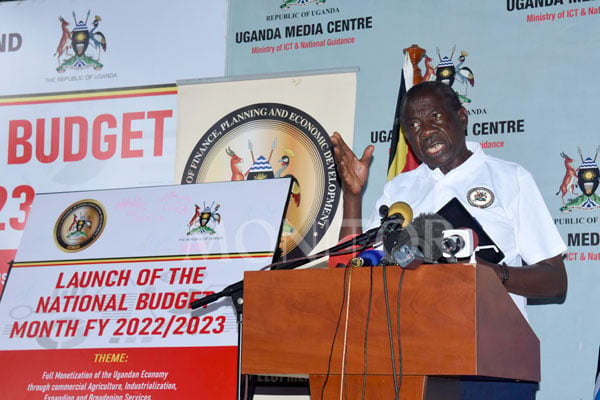Prime
Govt overruns April budget despite call for modest spend

Finance minister Matia Kasaija put expected growth at 3.8 percent this year. PHOTO/ ISAAC KASAMANI
What you need to know:
- Mr Julius Mukunda, an economist and budget expert, told this publication that the new report shows that government isn’t practicing what it is preaching to Ugandans
- Just last week, as Parliament coursed through Shs618b surplus budget, Opposition legislators Nandala Mafabi and Ssemujju Nganda questioned the government’s record on fiscal and budget discipline.
The government that has asked citizens to be frugal in the face of rising costs of living, spent more money in April than it budgeted, including on unbudgeted items.
Our analysis of the data in the new State of the Economy Report published by the Ministry of Finance, shows that the government had capped its April expenditure at Shs2.9 trillion.
Instead, it cracked the ceiling, spending Shs3.1 trillion or Shs200 billion more, despite Uganda Revenue Authority raising more money than the Shs1.5 trillion it planned to collect in April.
The core revenue streams for the stellar performance, the report authors noted, were taxes on educational institutions and fees paid by mad-rush passport applicants following the government’s decision to phase out the machine-readable versions of the travel document and replacing themwith e-passports.
Following the budget overruns, the government, according to the report, turned a borrower, issuing Treasury Bill and Bonds to raise more than Shs750b.
However, more than half of the money raised went into paying already maturing debt and while Shs326b bankrolled budgeted items. These spending heads were not specified in the document.
Mr Julius Mukunda, an economist and budget expert, told this publication that the new report shows that government isn’t practicing what it is preaching to Ugandans.
“[The] government must now show an example and spend less than what it is earning in revenue,” he said.
This analysis comes a day after President Museveni in a televised national address on Sunday night on the economic situation in the country, urged Ugandans to be “frugal”.
He said lowering taxes, particularly on fuel whose rising cost is driving up inflation, or providing subsidies on particularly overpriced and imported groceries, would be “suicidal” as it would hemorrhage government dollar reserves.
In the immediate, the President, speaking in reference to ongoing war in Ukraine triggered by Russia’s invasion of the neighbour, said he was engaging with “our friends”, the “mistake makers” to end the fighting that has choked global supplies, including of wheat and oil.
According to Mr Museveni, the oil prices heated to about $80 per barrel after oil companies cut back oil prospecting following loud campaign by environmentalists to phase out fossil fuel.
The solution to the current crisis, he reiterated, is Ugandans becoming “frugal”, and substituting imported consumables with local alternatives.
But the official data shows a government with increasing appetite and on a borrowing spree that crowds of local borrowers.
The Finance ministry prepares monthly performance of the economy report using data from Uganda Bureau of Statistics (Ubos) and the Bank of Uganda (BoU).
The data makes for the authoritative choices which government relies on to make decisions on the national economy.
Uganda’s fiscal discipline has always been questioned by activists and politicians.
Just last week, as Parliament coursed through Shs618b surplus budget, Opposition legislators Nandala Mafabi and Ssemujju Nganda questioned the government’s record on fiscal and budget discipline.
The Opposition, through shadow Finance minister Muwanga Kivumbi, appeared before the House Budget Committee, and in the alternative proposed a cut onrent for government premises, and a reduction in travel expenditure.
Finance officials warmed up to the blueprint, including slicing some fat off entertainment and allowances of ministries, departments and agencies.
Bureaucrats until now had been optimistic that Uganda’s economy, which like other global economies was battered by Covid-induced disruptions, was pedaling back to recovery.
Finance minister Matia Kasaija put expected growth at 3.8 percent this year.
However, rising inflation and global instability driven by mainly fuel and food prices, has dampened hope amid poisoned chalice options.




